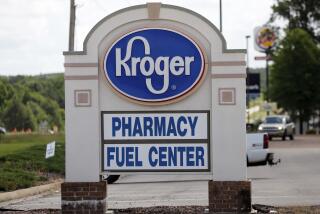How Will Firms Fare? It Depends
It may be the costliest court settlement in history, yet the tobacco industry will survive--and even prosper--once its legal future is settled. But how individual companies will fare under the new ground rules is far from clear.
The settlement will affect the major tobacco companies in varying ways, depending on how each companyâs tobacco sales are divided between U.S. and foreign markets, their overall financial condition and whether theyâre part of larger, diversified corporations.
Their financial health is important not just to a handful of institutional investors and wealthy executives. Tobacco companies are among the most widely held stocks in the nation.
Industry leader Philip Morris Cos., for instance, is a favorite of broad-based stock mutual funds--including many of those available to all manner of U.S. workers via their 401(k) retirement savings plans--and the stock also is one of the 30 members of the Dow Jones industrial average.
In fact, the growing prospect of a settlement--ending the uncertainty that is anathema to investors--already has given some of the stocks a boost, as have the companiesâ own strong operating performances of late.
Though tobacco stocks fell late Friday after the pact was announced, it was a moderate setback after months of strong performance.
One positive for the stocks: The companies will raise cigarette prices to cover the settlement costs. That will tend to offset the damage of the certain sales decline as smokers confront prices that could rise by as much as $1 a pack.
âItâs not like the industry is going to pay for this settlement,â observed David Adelman, a vice president and tobacco analyst at Morgan Stanley. âThe consumers are going to pay for it.â
The Value Line Investment Survey, a research firm, has estimated that Philip Morrisâ settlement tab alone could be $5 billion a year but that âboosting cigarette prices by a relatively modest [amount] should cover these costs.â
Some, like analyst John C. Maxwell Jr. of Wheat First Securities, warn that price hikes, coupled with higher cigarette excise taxes now in the works, will lower sales by at least 10% and drive smokers to cheaper and less profitable generic cigarettes.
But Wall Street doesnât seem worried. Despite the huge size of the total settlement package, Philip Morrisâ stock is up nearly 40% for the last 12 months, outpacing the 36% gain by the benchmark Standard & Poorâs 500 index. Loews Corp., which owns Lorillard Tobacco Co., is up 38% for the last year.
Others havenât fared as well, including RJR Nabisco Holdings Corp. and BAT Industries, the British parent of cigarette maker Brown & Williamson. But neither have they been pummeled on Wall Street for facing the settlementâs liability.
And none of the major tobacco companies is heavily indebted at this point, so they have the leeway to borrow, if needed, to help finance the settlement. Nearly all of the major players have long-term debt that amounts to a moderate 50% or less of their total capitalization, which is a measure of a firmâs financial framework and also includes the value of their common and preferred stocks.
Many of the tobacco companies also have other non-tobacco interests that affect their sales, profits and stock price. Their diversification could prove helpful in absorbing the financial shock of the settlement.
Take Philip Morris. The cigarette kingpin, which makes top-selling Marlboro as well as Benson & Hedges and Merit brands, also owns Kraft Foods (Jell-O, Oscar Mayer, Miracle Whip) and Miller Brewing, maker of Miller beer. Those non-tobacco operations account for 46% of Philip Morrisâ total sales.
RJR, producer of Salem, Winston and Camel cigarettes, has a similar profile. Its food holdings represent nearly half of the companyâs total business and include such familiar Nabisco brands as Oreo cookies, Ritz crackers and Planters peanuts.
Lorillardâs cigarettes account for only about 11% of total sales at Loews, which also runs hotels and provides insurance. But Lorillard represents more than 30% of Loewsâ profit, and the company faces a problem.
Most of its brand-name cigarettes, such as Kent and Newport, that generate most of Lorillardâs earnings are sold only in the United States. That means the company doesnât have a substantial cigarette business overseas that could help generate cash for paying its settlement expenses.
Not so with Philip Morris and RJR, who are benefiting from foreign markets at a time when domestic cigarette sales are basically flat. The settlement reached Friday does not apply to overseas operations.
Even though Philip Morris dominates the U.S. cigarette business with a market share of about 48%, its foreign tobacco operations are even bigger and growing even faster--both of which will also help the company pay its settlement tab.
In this yearâs first quarter, international sales accounted for a whopping 71% of Philip Morrisâ total tobacco sales of $9.9 billion.
Like Philip Morris, RJR sells far more cigarettes abroad than in the United States.
BAT, maker of Lucky Strike and other brands, relies on tobacco for about 65% of its total sales and is second only to Philip Morris in worldwide market share. The company sells its cigarettes in more than 80 countries, and that will help cushion the settlementâs blow.
Moreover, cigarettes are still an enormously profitable product, and that also will help the companies pay for the settlement, provided overall cigarette sales grow.
* MAIN STORY: A1; ADDITIONAL COVERAGE, A1,A13,D3
More to Read
Inside the business of entertainment
The Wide Shot brings you news, analysis and insights on everything from streaming wars to production â and what it all means for the future.
You may occasionally receive promotional content from the Los Angeles Times.











